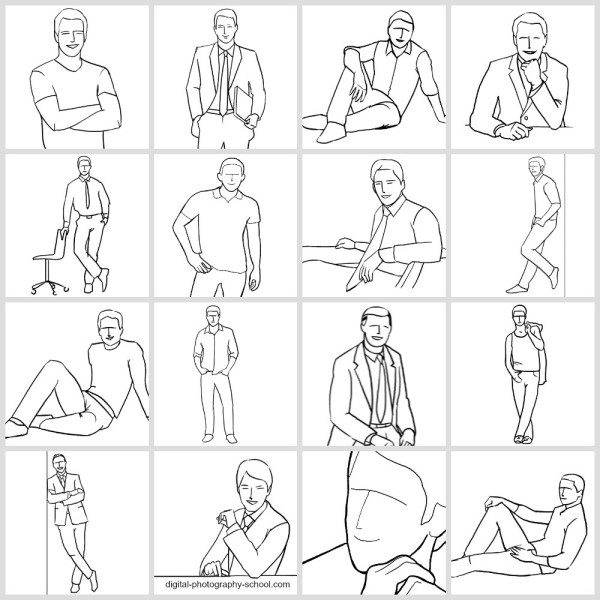Posing Guide: 21 Sample Poses to Get You Started with Photographing Men

Previously we’ve created posing guides with suggested sample poses to help you get started posing women (also see part 2 for posing women), posing children, posing couples, posing groups, and posing weddings, so today let’s look at some sample starting poses for photographing men.
Men are usually less comfortable with being photographed, so it’s important to set them at ease with posing in order to get good results.
It is always a good idea to prepare before the photoshoot.
Just one more piece of advice: Involve your subject in the process!
He will feel more confident knowing the plan, what he has to “do,” and what kind of outcome is expected. Showing this kind of posing cheat sheet to your model is indeed a very good way to prepare your subject for a photoshoot and make him feel more relaxed and confident at the same time.
So, let’s look at some sample poses for men
1. Very simple pose for a man’s portrait: An upper body shot with crossed arms.
Two things to take care of: Shoulders should be pulled back a little, stomach muscles kept in check.

2. Crossed arms work very well in full height shots as well. In addition, ask him to cross one leg in front of the other. But make sure the body weight is not supported equally on both legs; otherwise, that would look just awkward!

3. A recurring question from your subject might be “Where shall I put
my hands?” The solution is actually quite simple. There are four places
to keep in mind (mixed in any combination, utilizing both hands).
#1. Loosely by the side.
#2. On the hips.
#3. In the pockets.
#4. Both hands crossed on the chest.
And in addition, hands should always be relaxed, which means no muscle pressure, except when you are photographing a bodybuilder.

4. A casual pose for a man standing upright. Men indeed have a problem with placing their hands; by keeping them fully or partly in the side pockets, you have a sure way to achieve a natural and relaxed pose.

5. Just a slight variation on the previous pose. A piece of clothing over the shoulder, merely a thumb in the pocket, and legs crossed work very well.

6. For a sitting pose, putting the ankle of one leg onto the knee of the other looks relaxed and natural. Shoot slightly from above.

7. Leaning against a wall is just another variant for upright posing.

8. The sideways way of leaning against the same wall. Works very well for both casual and formal shots.

9. A very simple pose for a formal portrait. Items held in the hand (e.g. a laptop, books, or even tools) can work as indicators of the subject’s occupation.

10. Against common belief, it is absolutely fine to make shots of a man sitting partly on a desk. For formal portraits, such a pose might counteract rigidness.

11. A very simple pose for a portrait: A man sitting at a desk. To reveal the subject’s profession, place work-related items on the desk.

12. A slight variation of the previous pose. Very appropriate for formal portraits.

13. To show the work environment while removing the distance created by a foreground object like a desk, take your shot from the backside. The result will be formal but inviting at the same time.

14. A man supporting himself on a desk with arms crossed. Again, you could place work-related items on the desk to point to the subject’s profession.

15. Using a chair as a prop can make a portrait more engaging and interesting. Very suitable when introducing creative people in their work environment.

16. Sitting comfortably in a chair usually works for corporate and formal portraits.

17. An easy and natural pose with a man sitting on the ground. Try different shooting directions and angles.

18. Another variant of a man’s pose while sitting on the ground. Suitable for outdoor locations.

19. An easy and relaxed-looking pose for a sitting man.

20. Informal pose. The man is sitting on the ground resting his back against the wall or some object.

21. Finally, let your subject be the protagonist of your picture. Never be afraid to crop tightly around the model’s face.

That should offer a starting point. Again, remember that there are no absolutes; each sample pose might and should be adjusted depending on your shooting environment and scenario. There is no need to overdo anything.
In reality, all you need for good people portraits is simplicity:
Simple backgrounds, simple clothing, simple poses, and natural expressions.
No comments:
Post a Comment
Note: Only a member of this blog may post a comment.